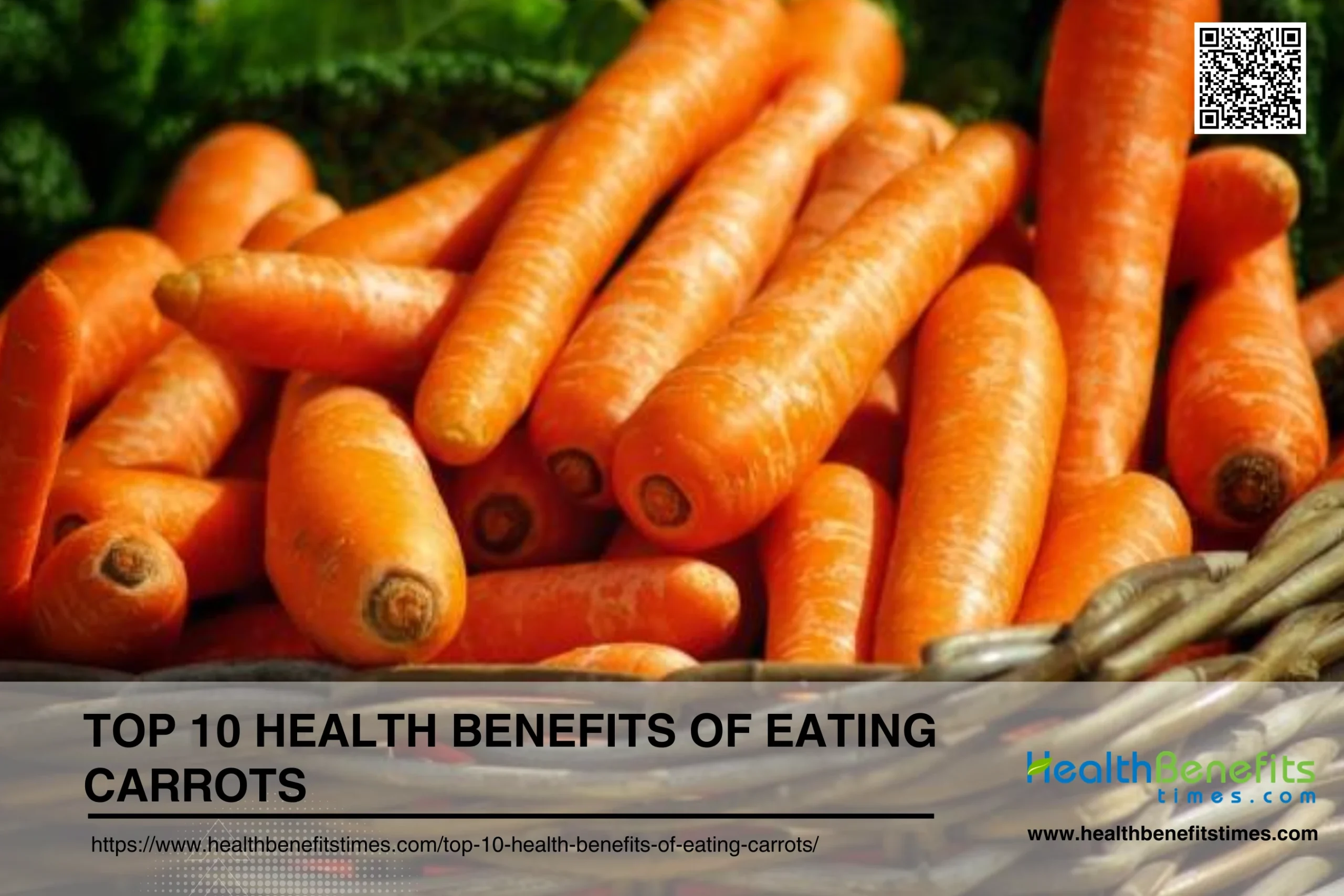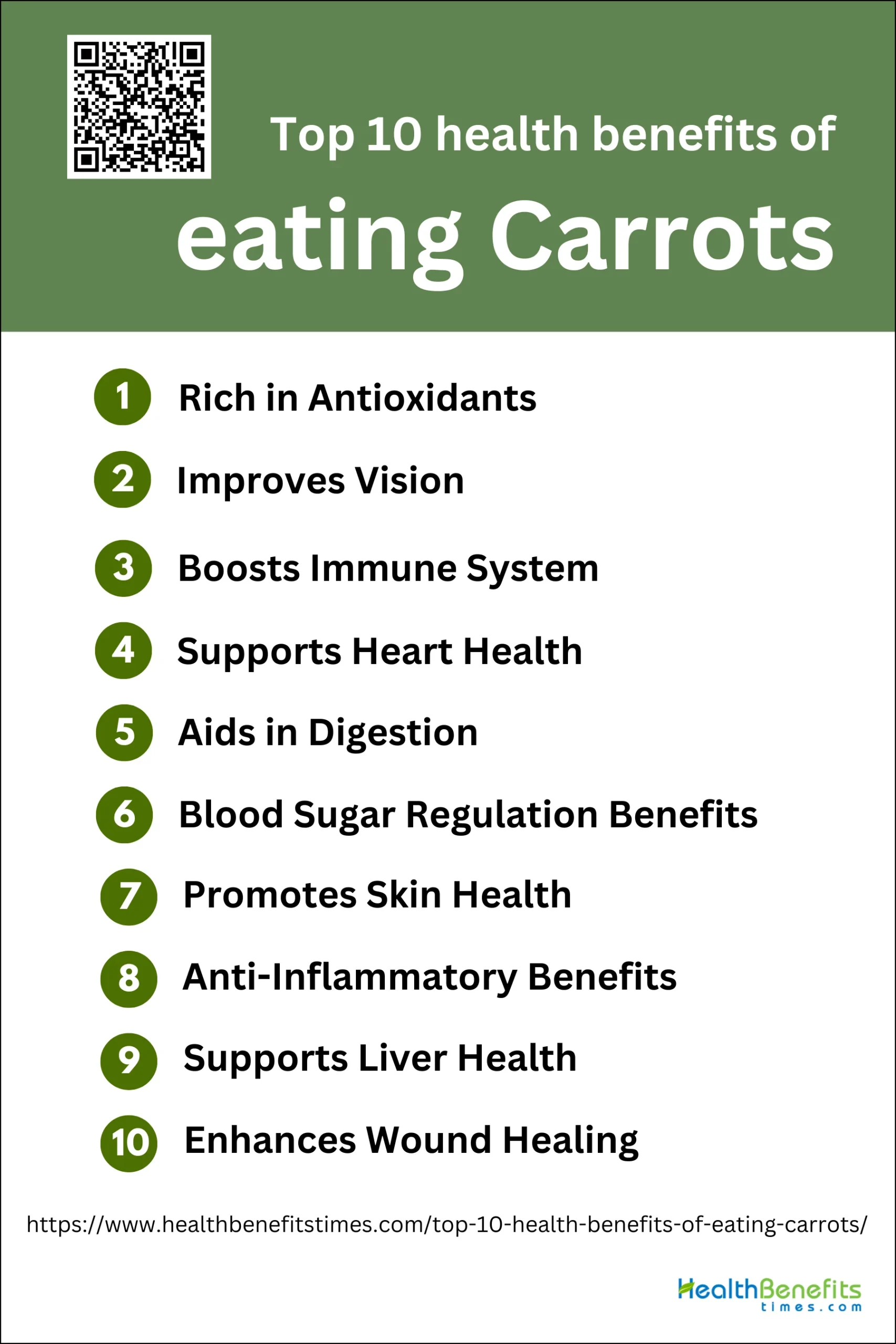- Improves vision, boosts immunity, prevents cancer, enhances skin, supports digestion.
- Boosts vision, strengthens immunity, aids digestion, promotes heart health, anti-inflammatory.
- Supports heart health, aids digestion, regulates blood sugar, promotes skin health.
- Anti-inflammatory, liver support, enhances wound healing, boosts immunity, improves vision.
 Carrots are more than just a crunchy, colorful addition to your meals—they’re a powerhouse of nutrition. Packed with essential vitamins, minerals, and antioxidants, carrots offer a myriad of health benefits that can enhance your overall well-being. From improving vision and boosting immunity to aiding in weight loss and promoting heart health, the top health benefits of eating carrots are truly impressive. Whether you enjoy them raw, cooked, or juiced, incorporating carrots into your daily diet can provide significant health advantages. Let’s dive into the top 10 health benefits of eating carrots and discover why this versatile vegetable deserves a spot on your plate.
Carrots are more than just a crunchy, colorful addition to your meals—they’re a powerhouse of nutrition. Packed with essential vitamins, minerals, and antioxidants, carrots offer a myriad of health benefits that can enhance your overall well-being. From improving vision and boosting immunity to aiding in weight loss and promoting heart health, the top health benefits of eating carrots are truly impressive. Whether you enjoy them raw, cooked, or juiced, incorporating carrots into your daily diet can provide significant health advantages. Let’s dive into the top 10 health benefits of eating carrots and discover why this versatile vegetable deserves a spot on your plate.
What is carrot?
Carrots (Daucus carota L.) are a widely consumed root vegetable known for their high nutritional value and health benefits. Originally yellow and purple, carrots have been biofortified to enhance their provitamin A content, resulting in varieties that also contain potent antioxidants like anthocyanins and lycopene. Carrots are rich in bioactive compounds such as carotenoids and dietary fibers, which contribute to their anticancer properties and overall health-promoting effects. Regular consumption of carrots has been linked to a reduced risk of colorectal cancer, likely due to the presence of bioactive polyacetylenic oxylipins like falcarinol and falcarindiol, which exhibit anti-inflammatory and anti-proliferative activities. Additionally, carrots are used in various processed forms, including juices, which retain their nutritional and antioxidant properties. The sensory and nutritional qualities of carrots can vary based on their color, with purple carrots showing higher antioxidant activities compared to the more familiar orange varieties. The use of biostimulants in carrot cultivation can also influence their nutritional content, particularly the levels of nitrates and nitrites. Overall, carrots are a versatile and functional food that provides significant health benefits beyond basic nutrition.
Top 10 health benefits of eating Carrots
Packed with essential vitamins, minerals, and antioxidants, carrots can support your overall well-being in numerous ways. From boosting your vision and enhancing your immune system to aiding in weight management and promoting heart health, the benefits of eating carrots are extensive and well-documented. In this article, we’ll explore the top health benefits of incorporating this versatile vegetable into your diet, revealing why carrots deserve a prominent place on your plate.
1. Rich in Antioxidants
Carrots are a rich source of antioxidants, which provide numerous health benefits. Consuming carrot juice has been shown to significantly increase plasma total antioxidant capacity and decrease lipid peroxidation, which can protect the cardiovascular system. Additionally, carrots are high in beta-carotene, a precursor to vitamin A, which is essential for maintaining good vision, immune function, and skin health. Studies have demonstrated that supplementing diets with grated carrots can improve vitamin A status in lactating women, thereby enhancing their overall nutritional profile. Furthermore, the antioxidant properties of carrots can help reduce DNA damage in lymphocytes, which is particularly beneficial for smokers who are at a higher risk of oxidative stress and related diseases. Overall, the inclusion of carrots in the diet can contribute to better antioxidant status, reduced oxidative stress, and improved health outcomes.
2. Improves Vision
Carrots are well-known for their health benefits, particularly in improving vision. This is primarily due to their high beta-carotene content, which the body converts into vitamin A, a crucial nutrient for maintaining healthy vision. Research has shown that increased consumption of beta-carotene-rich foods like carrots can significantly enhance serum retinol levels, which is essential for good vision, especially in low-light conditions. Additionally, lutein, another carotenoid found in yellow carrots, has been shown to increase macular pigment density, potentially reducing the risk of macular degeneration, a common cause of vision loss. Furthermore, studies have indicated that higher intake of fruits and vegetables, including carrots, is associated with a decreased likelihood of glaucoma, particularly in older African-American women. Therefore, incorporating carrots into the diet can play a vital role in maintaining and improving eye health.
3. Boosts Immune System
Carrots are famous for their numerous health benefits, particularly in boosting the immune system. Research has shown that dietary supplementation with carrot-derived rhamnogalacturonan-I (cRG-I) can significantly enhance immune responses. For instance, cRG-I has been found to accelerate and augment local innate immune and anti-viral interferon responses to rhinovirus infections, reducing the severity and duration of symptoms in humans. Additionally, the consumption of carrot juice, which is rich in beta-carotene, has been shown to modulate immune functions by increasing plasma carotenoid concentrations and enhancing the activity of natural killer (NK) cells and cytokine secretion. Furthermore, a high intake of carotenoid-rich vegetables, including carrots, has been associated with a reduction in plasma C-reactive protein levels, indicating a decrease in inflammatory processes. Carrot juice also contains compounds like falcarinol and falcarindiol, which have been shown to reduce the secretion of pro-inflammatory cytokines, thereby priming blood leukocytes to better cope with inflammatory conditions. Overall, the regular consumption of carrots can play a crucial role in supporting and enhancing the immune system, making it a valuable addition to a healthy diet.
4. Supports Heart Health

Carrots are highly beneficial for heart health due to their rich antioxidant content and ability to reduce lipid peroxidation. Regular consumption of carrot juice has been shown to significantly increase plasma total antioxidant capacity and decrease plasma malondialdehyde production, which are markers of oxidative stress and lipid peroxidation, respectively. This suggests that carrots can help protect the cardiovascular system by enhancing antioxidant status and reducing oxidative damage to lipids. Additionally, a study found that consuming raw carrots daily significantly reduced serum cholesterol levels by 11%, which is a crucial factor in managing cardiovascular health. Furthermore, diets rich in fruits and vegetables, including carrots, have been associated with lower cardiovascular disease risk and reduced mortality rates, highlighting the importance of incorporating these foods into daily diets for heart health. Therefore, the inclusion of carrots in the diet can support heart health through multiple mechanisms, including antioxidant protection and cholesterol reduction.
5. Aids in Digestion
Carrots are extremely helpful for digestion due to their rich dietary fiber content. Consuming raw carrots has been shown to significantly increase fecal weight by 59%, which aids in promoting regular bowel movements and reducing constipation. The dietary fiber in carrots, particularly non-digestible polysaccharides, interacts with the gut microbiota, enhancing the growth of beneficial bacteria and improving gut health. Additionally, the increased intake of dietary fiber from carrots can shorten the mean transit time through the gut, further aiding in digestion and potentially reducing the risk of colonic diseases. Moreover, the consumption of raw carrots has been associated with increased fecal bile acid and fat excretion, which can contribute to a healthier digestive system. Overall, incorporating carrots into the diet can lead to significant improvements in digestive health through various mechanisms, including increased fecal bulk, enhanced gut microbiota, and improved bowel regularity.
6. Blood Sugar Regulation Benefits
Consuming vegetables, including carrots, before carbohydrates has been demonstrated to improve daily fiber intake and lower blood sugar levels in patients with type 2 diabetes mellitus. Additionally, increased vegetable intake, including carrots, has been associated with improved glycemic control in adults with type 2 diabetes, as evidenced by reductions in glycated hemoglobin (HbA1c), fasting blood glucose, and post-prandial blood glucose levels. Furthermore, the consumption of raw carrots has been linked to lower glucose and insulin responses, suggesting that the dietary fiber in carrots plays a crucial role in moderating blood sugar levels. These findings underscore the importance of incorporating carrots into the diet as a natural strategy for blood sugar regulation and overall metabolic health.
7. Promotes Skin Health
Carrots are renowned for their frequent health benefits, particularly in promoting skin health. Regular consumption of carrots can significantly improve skin appearance due to their high beta-carotene content, which is converted into vitamin A in the body. Vitamin A is essential for skin repair and maintenance, and it helps to prevent skin dryness and blemishes. A study demonstrated that supplementing lactating women with grated carrots improved their vitamin A status, which is crucial for maintaining healthy skin. Additionally, the consumption of fruits and vegetables, including carrots, has been shown to enhance skin color, giving it a healthy and attractive glow due to the increased red/yellow/orange pigments in the skin. This visual improvement in skin appearance can serve as a strong motivation for individuals, especially younger adults, to increase their intake of carrots and other vegetables. Therefore, incorporating carrots into the diet can be a simple yet effective strategy to promote skin health and overall well-being.
8. Anti-Inflammatory Benefits
Carrots offer important anti-inflammatory benefits, primarily due to their rich content of bioactive compounds such as falcarinol and falcarindiol. Research has demonstrated that the intake of carrot juice can modulate inflammatory responses in the human body. For instance, a study found that consuming 500 mL of carrot juice led to a significant reduction in pro-inflammatory cytokines IL1α and IL16 in lipopolysaccharide-stimulated blood samples, indicating a priming effect on blood leukocytes to better manage inflammatory conditions. Additionally, another study highlighted that carrot juice intake increased the levels of certain cytokines and chemokines, such as IL-15 and those in the IL-23/IL-17 Th17 axis, which are crucial for immune response modulation. These findings suggest that regular consumption of carrot juice can help reduce inflammation and support the immune system, making it a beneficial addition to the diet for managing inflammatory conditions.
9. Supports Liver Health

The consumption of carrots, especially in the form of carrot juice, has been shown to have significant antioxidant properties. For instance, drinking carrot juice has been found to increase plasma total antioxidant capacity and decrease lipid peroxidation, which are crucial for protecting the liver from oxidative stress and damage. Additionally, the intake of carrot juice rich in bioactive compounds such as falcarinol and falcarindiol can modulate inflammatory responses, which is beneficial for liver health as chronic inflammation is a known risk factor for liver diseases. Moreover, excessive consumption of carrots can lead to hypercarotinemia, which, although generally harmless, can indicate high levels of beta-carotene that the liver must process, potentially leading to elevated liver enzymes if consumed in extreme amounts. Therefore, moderate consumption of carrots can support liver health by enhancing antioxidant defenses and reducing inflammation, while excessive intake should be avoided to prevent potential liver strain.
10. Enhances Wound Healing
This benefit is primarily attributed to the presence of bioactive compounds such as rhamnogalacturonan-I (RG-I) and various antioxidants. Research has shown that dietary supplementation with carrot-derived RG-I can significantly accelerate and augment the innate immune response, which is crucial for effective wound healing. For instance, a study demonstrated that RG-I from carrots enhanced local immune responses and reduced the severity and duration of symptoms in individuals infected with rhinovirus, indicating a robust activation of the immune system. Additionally, the high antioxidant content in carrots, such as beta-carotene, has been shown to increase plasma antioxidant status and reduce lipid peroxidation, which can protect cells from oxidative damage and promote faster tissue repair. Furthermore, the anti-inflammatory properties of compounds like falcarinol and falcarindiol found in carrot juice can modulate cytokine responses, reducing inflammation and supporting the healing process. These findings collectively suggest that incorporating carrots into the diet can be a beneficial strategy for enhancing wound healing through improved immune function and reduced oxidative stress.
Conclusion
Carrots are a nutritional powerhouse that offer a multitude of health benefits. From boosting antioxidant levels and enhancing vision to supporting immune function and promoting heart health, the regular consumption of carrots can significantly improve overall well-being. Their rich fiber content aids in digestion and blood sugar regulation, while their anti-inflammatory properties and bioactive compounds like falcarinol and falcarindiol contribute to skin health, liver protection, and wound healing. With their versatility in culinary applications and their ability to provide essential vitamins, minerals, and phytochemicals, carrots are a valuable addition to any diet aimed at promoting optimal health and longevity.
ADDITIONAL RESOURCES
In the United States, several organizations are dedicated to researching and promoting the health benefits of vegetables. These organizations conduct scientific studies, provide educational resources, and advocate for public policies that encourage the consumption of vegetables as part of a balanced diet. Below is a list of notable organizations involved in this important field of research.
List of Organizations
1. American Institute for Cancer Research (AICR)
Focus: Research on the role of diet, including vegetables, in cancer prevention and survival.
2. The Produce for Better Health Foundation (PBH)
Focus: Encouraging increased consumption of fruits and vegetables for better health through various campaigns and research initiatives.
3. United States Department of Agriculture (USDA)
Focus: Comprehensive research on agriculture, including the nutritional benefits of vegetables, and promoting healthy eating guidelines.
4. Academy of Nutrition and Dietetics
Focus: Provides resources and conducts research on diet and nutrition, including the benefits of vegetables.
5. Centers for Disease Control and Prevention (CDC) – Nutrition, Physical Activity, and Obesity Program
Focus: Research and guidelines on nutrition, emphasizing the health benefits of a diet rich in vegetables.
6. Johns Hopkins Center for a Livable Future
Focus: Research on food systems and their impact on health and the environment, including the benefits of vegetable consumption.
7. Harvard T.H. Chan School of Public Health – Nutrition Source
Focus: Providing evidence-based information on nutrition, including the health benefits of vegetables.
8. The Veggie Van Organization
Focus: Promotes access to fresh vegetables in underserved communities and conducts research on the health impacts of vegetable consumption.
Recommendations for books on research and health benefits of vegetables
Here are some recommended books on the research and health benefits of vegetables:
1. “Vegetables: Types, Nutritional Composition and Health Benefits“ by S. Hajjar, K. Darwish, and S. Darwish
This book explores the different types of vegetables, their nutritional composition, and the health benefits they offer.
2. “The Health Benefits of Fruits and Vegetables: A Scientific Overview of Essential Nutrients and Disease Prevention“ by Michael T. Murray
This book provides a comprehensive overview of the essential nutrients found in fruits and vegetables and their role in disease prevention.
3. “Vegetables, Whole Grains, and Their Derivatives in Cancer Prevention“ by Mou-Tuan Huang
This book discusses the role of vegetables and whole grains in cancer prevention, backed by scientific research.
4. “Nutrition and Health: Fruits and Vegetables“ by Margot Skinner and Denise Hunter
This book covers the health benefits of various fruits and vegetables, emphasizing their importance in a balanced diet.
5. “The Health Benefits of Organic Food: Effects of the Environment“ by Debra R. Benjamin
Although not exclusively about vegetables, this book examines the health benefits of organic foods, including vegetables, and their environmental impact.
FAQS
- What are the primary health benefits of eating carrots?
Carrots offer numerous health benefits, including improved vision, enhanced skin health, boosted immunity, better digestion, weight management, lower cholesterol levels, reduced cancer risk, heart health support, oral health benefits, and bone strengthening. - How do carrots improve vision?
Carrots are rich in beta-carotene, which the body converts into vitamin A. Vitamin A is essential for maintaining good vision and preventing night blindness. - Can eating carrots help with weight loss?
Yes, carrots are low in calories and high in fiber, which helps you feel full longer and reduces the urge to snack on unhealthy foods, aiding in weight management. - How do carrots benefit skin health?
Carrots contain antioxidants like beta-carotene and vitamin C, which help protect the skin from sun damage, improve skin texture, and promote collagen production for youthful, elastic skin. - What role do carrots play in boosting immunity?
Carrots are rich in vitamins A and C, which are crucial for a strong immune system. Vitamin A helps maintain mucous membranes, while vitamin C supports the production of white blood cells. - Can carrots help lower cholesterol levels?
Yes, the soluble fiber in carrots can help lower cholesterol levels by binding to cholesterol in the digestive tract and preventing its absorption into the bloodstream. - How do carrots support heart health?
Carrots contain antioxidants, fiber, and potassium, which help regulate blood pressure and reduce the risk of heart disease by improving cholesterol balance and reducing inflammation. - Are carrots beneficial for digestive health?
Carrots are high in dietary fiber, which promotes healthy digestion, regular bowel movements, and prevents constipation. - Do carrots have anti-cancer properties?
Carrots contain antioxidants and phytochemicals like beta-carotene, which have been linked to a reduced risk of various cancers, including colorectal, lung, and breast cancer. - How do carrots contribute to oral health?
Chewing raw carrots can help clean teeth and gums by removing plaque and food particles. Carrots also contain nutrients that support the strength and integrity of teeth.


